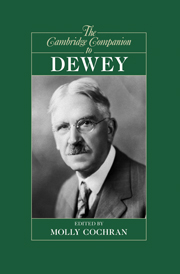Book contents
- Frontmatter
- Introduction
- 1 The making of a democratic philosopher: the intellectual development of John Dewey
- 2 Dewey’s epistemology
- 3 The naturalism of John Dewey
- 4 Dewey’s logic of inquiry
- 5 The primacy of practice in Dewey’s experimental empiricism
- 6 Cognitive science and Dewey’s theory of mind, thought, and language
- 7 John Dewey and action
- 8 Dewey’s moral philosophy
- 9 Ethics as moral inquiry: Dewey and the moral psychology of social reform
- 10 Dewey and pragmatic religious naturalism
- 11 Dewey’s aesthetics
- 12 Dewey’s philosophy of education: a critique from the perspective of care theory
- 13 Dewey’s vision of radical democracy
- 14 Dewey as an international thinker
- Bibliography
- Index
10 - Dewey and pragmatic religious naturalism
Published online by Cambridge University Press: 28 September 2010
- Frontmatter
- Introduction
- 1 The making of a democratic philosopher: the intellectual development of John Dewey
- 2 Dewey’s epistemology
- 3 The naturalism of John Dewey
- 4 Dewey’s logic of inquiry
- 5 The primacy of practice in Dewey’s experimental empiricism
- 6 Cognitive science and Dewey’s theory of mind, thought, and language
- 7 John Dewey and action
- 8 Dewey’s moral philosophy
- 9 Ethics as moral inquiry: Dewey and the moral psychology of social reform
- 10 Dewey and pragmatic religious naturalism
- 11 Dewey’s aesthetics
- 12 Dewey’s philosophy of education: a critique from the perspective of care theory
- 13 Dewey’s vision of radical democracy
- 14 Dewey as an international thinker
- Bibliography
- Index
Summary
John Dewey is often regarded as a purely secular thinker, a “naturalist” and “humanist.” In most commentaries, Dewey's pragmatism, including his moral, social, and educational thought, is barely, if at all, connected with his views on religion, in contrast to another classical pragmatist, William James, whose explorations of religious themes, emphasizing the value of individual believers' experiential perspectives, continuously attract scholars' attention. This chapter, however, discusses the socially oriented, pragmatically naturalist conception of religious faith Dewey developed in A Common Faith and elsewhere, as well as Dewey's influence on pragmatically naturalist currents in the philosophy of religion. In particular, Dewey's distinction between “the religious,” on the one side, and actual religions, on the other, is emphasized. According to Dewey, the religious aspects of experience can be appreciated without metaphysical commitments to anything supernatural. Here a problem arises: can the religious qualities of experience be fully naturalized by understanding them in a Deweyan manner as imaginative relations to human ideals, or will such naturalization inevitably reduce religious experience to something else?
- Type
- Chapter
- Information
- The Cambridge Companion to Dewey , pp. 211 - 241Publisher: Cambridge University PressPrint publication year: 2010
- 7
- Cited by

